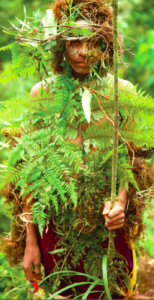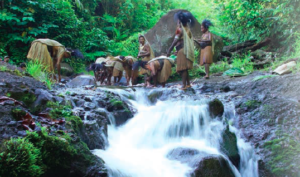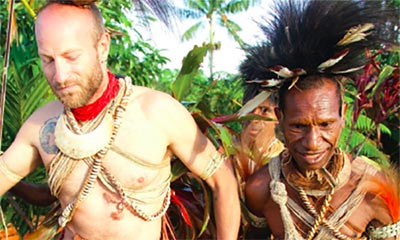Richard Andrews meets an American survival expert who teaches wilderness skills and recently visited PNG for a TV documentary series.
PNG’s grubs and other insects are delicious,” says US survival expert Tom McElroy, who recently visited New Britain to film a documentary series for the Discovery Channel. McElroy rates the local bush tucker high ona menu that has also included monkey arm, tapir and parrot stew.
McElroy’s taste for such fare stems from years spent in the jungles of Sumba, West Papua, Costa Rica and the Amazon, among others.
“Indigenous people around the world have generously taught me skills passed down over 100,000 years,” he says. “I’ve learned how to walk into the woods, without even a knife, and make everything I need from nature.”
He says he was first inspired to “shed the restrictions of society” by the writings of naturalist-philosopher John Muir, together with Jack Kerouac’s road tales of hopping freight trains and hitching around America.
“I saw survival skills as the key to freedom,” says McElroy. He pursued that dream at the age of 18 with two friends by living off the land for a year in a large forest in southern New Jersey. The trio survived at first by eating plants and berries, then made their own bows to hunt rabbits and deer.

At one with the land … a PNG hunter in camouflage at Mount Bosavi, in the Highlands.
Looking back, McElroy admits it was not all a romantic adventure, but included periods of cold, hunger, feelings of isolation and squabbles amongst the group.
Nevertheless, McElroy was undaunted by the physical and mental challenges of life as a hunter-gatherer. He went on to study anthropology and sought out Native Americans to gain more traditional knowledge
“I found they were keen to pass on the ancient physical skills, to complement the current interest in the spiritual aspects of their culture,” he says.
For the past two decades, McElroy has travelled the world to learn from other indigenous groups by living with them. “Particularly memorable was my time with the Huaorani, in the Amazon region of Ecuador,” he says. “The remote community was ‘discovered’ only in the 1960s by missionaries who got killed for their troubles.”
As yet another outsider, McElroy overcame initial suspicion and gained acceptance through his ability to adapt to the local environment. One way was to show he could fire curare-tipped darts from a blowgun alongside the best hunters.
“Despite their fierce reputation, the Huaorani are now peaceful,” he says. “However the 80-year-olds still talk openly about their violent past, saying they hadn’t been taught it was wrong to kill missionaries.”
McElroy passes on his skills through Wild Survival – a school that runs courses for hunters, outdoor enthusiasts and elite military groups such as SEAL Team Six.
Students learn skills such as how to starta fire, trap fish, use a stone axe, make a bark canteen, build a survival shelter or paddle to safety in an animal-skin kayak. One popular course involves carving a longbow that will “bring down any animal on this continent”.
McElroy is also in demand as a consultant for Hollywood movies, which appropriately include The Hunted , as well as The Village , a thriller set in Pennsylvania with Sigourney Weaver, William Hurt and Adrien Brody.
“Before shooting started, we wanted to teach the actors how to walk in the woods,” says McElroy. “As an awareness exercise we blindfolded them far from the camp and they had to find their way back safely, guided only by the sound of a drum. I was surprised how they really got into it and no-one peeked.”
McElroy featured in Trailblazers , a Discovery Channel series of documentaries set in PNG, Bolivia and Ecuador. His role was to lead a team of scientists searching for new species around Bago in East New Britain and the Lake Hargy region of West New Britain – largely undisturbed areas of rainforest, considered to have significant biological value.
“I found the locals very welcoming and used my time to get to know them,” he says.
“Survival skills are a point of communication. If you can make fire with two sticks or hunt with a spear it shows you’re connected to the land and can be trusted. While the film crew were running around in high-tech jungle boots, I made a point of walking barefoot.”
However, one high-tech aspect of the shoot struck a real chord. “We used a live feed from drones to show the forest from above. People crowded around the monitors, fascinated to see that overhead perspective of their environment for the first time.”
 Seeing McElroy’s respect for traditional ways, local leaders in PNG have approached him to run survival courses as a way of sharing their culture and attracting eco-friendly tourism. “Following the invitation, I’m planning excursions with my partner Blake Everson,” says McElroy. “Wild Survival has visited Fogomaiy’u, Telesu and Seane Falls in the Mount Bosavi area of the Southern Highlands. They’d be great places to start.”
Seeing McElroy’s respect for traditional ways, local leaders in PNG have approached him to run survival courses as a way of sharing their culture and attracting eco-friendly tourism. “Following the invitation, I’m planning excursions with my partner Blake Everson,” says McElroy. “Wild Survival has visited Fogomaiy’u, Telesu and Seane Falls in the Mount Bosavi area of the Southern Highlands. They’d be great places to start.”
According to McElroy, teaching survival skills encourages the next generation to see their culture as ‘cool’. “I’ve found that young people renew their respect for traditional knowledge when they see affluent visitors from the world of cellphones and computers seeking out the wisdom of village elders “They’re the real experts, not the people you see on TV.”
McElroy also believes survival living changes the way people approach their entire lives, because it helps them face challenges and reconnects them to the natural world.
“It’s more fun than playing with video games,” said one young boy in a children’s class. That’s music to McElroy’s ears – played on a traditional reed flute, of course.

